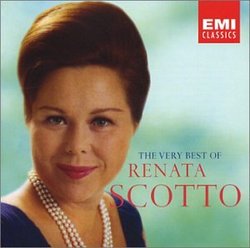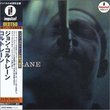| All Artists: Sherrill Milnes, Renato Bruson, Matteo Manuguerra, Rolando Panerai, Giacomo Puccini, Arrigo Boito, Ruggero Leoncavallo, Vincenzo Bellini, Giuseppe Verdi, Gioachino Rossini, Gaetano Donizetti, James Levine, Ermanno Wolf-Ferrari, Riccardo Muti, John Barbirolli, Anna di Stasio, National Philharmonic Orchestra, Philharmonia Orchestra of London, Teatro dell'Opera di Roma Chorus & Orchestra, Renata Scotto Title: The Very Best of Renata Scotto Members Wishing: 0 Total Copies: 0 Label: EMI Classics Release Date: 9/2/2003 Genre: Classical Styles: Opera & Classical Vocal, Historical Periods, Modern, 20th, & 21st Century Number of Discs: 2 SwapaCD Credits: 2 UPC: 724358510829 |
Search - Sherrill Milnes, Renato Bruson, Matteo Manuguerra :: The Very Best of Renata Scotto
 | Sherrill Milnes, Renato Bruson, Matteo Manuguerra The Very Best of Renata Scotto Genre: Classical
|
Larger Image |
CD DetailsSimilar CDs
|
CD ReviewsThe "Singer's Singer" Bruce Varner | Chicago area, USA | 01/23/2007 (5 out of 5 stars) "I am thrilled to write the first review of this CD. It is wonderful, and a must-have for fans of lyric sopranos and opera lovers in general. This CD is a real treat, because it has recordings of Ms. Scotto at various stages of her career: the mid-late 50's, 60's, 70's, and early 1980's. It is instructive and interesting to hear the trajectory of her voice over the years, and priceless to hear some of the roles and arias she truly made her own. Let's start with the earlier recordings, made between 1958 and 1966. Here is the Renata Scotto that took the world by storm after stepping in for an "indisposed" Maria Callas in 1953. These are truly awesome. One of my favorites is her "Una voce poco fa". She sings it like she was born to sing it. I can also imagine a very cute 24 year old Renata Scotto charming everyone as Rosina. But the highlight of this group is definitely the "Madama Butterfly" from the famous 1966 recording she made with Barbirolli. There are six full arias/duets, starting with "A! Quanto cielo!" and ending with "Tu? tu? piccolo iddio!" The "Un bel di" is sublime, and the "Vogliatemi bene" duet with Carlo Bergonzi was transporting. She then includes two arias from "Nabucco". This is probably one of those problematic career roles many people fault her for. Abigail is a very strenuous role. The character is mad...through the whole opera. She's constantly agitated and yelling. That means it is a scream fest for soprano. I just wince when I hear these arias. She does them OK, but really has to push. The later selections show a mature Scotto. These recordings were made in 1980 and 1981. There are some amazing things here. I was least impressed by her three selections from "La Boheme". Her money notes in "Si. Mi chiamano Mimi" are unsteady and her vibrato kind of wide. But, you think, hey it happens over time, right? Then, you hear a recording of six selections from "La Traviata" from two years later. Incredible. The very difficult first big scene, starting with "E strano" and ending with "Sempre libera" was perfect. Her "Teneste la promessa" will break your heart. It was without a doubt, one of the best Violettas I've ever heard. And, before we end, her "Vissi d'arte" was the best I've ever heard. It is an amazing performance by a woman, who at age 47, really understood what the aria is about. I've heard it so many times, and by so many great singers. With Renata, I felt I was hearing it for the first time. Brava Scotto and EMI. Thank you for this wonderful CD. Highly recommended. " The lush and skilled voice of Renata Scotto Steven A. Peterson | Hershey, PA (Born in Kewanee, IL) | 09/04/2007 (5 out of 5 stars) "Renata Scotto was an esteemed soprano of the 1950s and 1960s and into the 1970s. She was known well for her characterization. She combined a rich, skilled voice with the ability to create characters on stage. This 2 CD set illustrates her art quite nicely.
Some illustrative cuts: "Si, mi chiamano Mimi": This wonderful aria from "La Boheme" is natural for Scotto. Her smooth, rich voice captures the young Mimi nicely. There is a poignant characterization evident as well. She is a great stylist here, without some of the annoying affectations that occasionally mar singers' performances. Nice transition from register to register. "O soave fanciulla": This represents one of the great duets in opera. She and her partner, Alfredo Kraus, blend their voices most attractively. Kraus begins wonderfully; when Scotto joins him, it is "goose bump city." A wonderful version of this duet. "Qui la voce. . .Vien diletto": Scotto's lush voice is attractive here. She is not a coloratura soprano per se, but her characterization is striking. There is a hint of vocal strain here and there; there is also a bit of shrillness on occasion. But no big deal. The cabaletta is musical, but without much ornamentation. "E strano. . .Sempre libera": One of Scotto's signature roles was Violetta in "La Traviata." This was sung later in her career, and it shows. Her characterization is fine, but the voice is not what it once was. There is some harshness here and there; the shift from middle to higher register is not as smooth as earlier in her career. Nonetheless, a compelling start and an animated "Sempre libera." "Spargi d'amaro pianto": One thinks of Joan Sutherland or Beverly Sills here, not Renata Scotto. This was recorded in 1959, in her prime. This cabaletta is richly sung, without much ornamentation. While it is rather vanilla, there are nice staccato notes and a fine concluding high note. "Un bel di vedremo": Ravishing. That's the word I'd use to describe her singing on this well known aria. All in all, a very nice introduction to Renata Scotto's musical corpus. Well worth listening to. " |

 Track Listings (16) - Disc #1
Track Listings (16) - Disc #1
